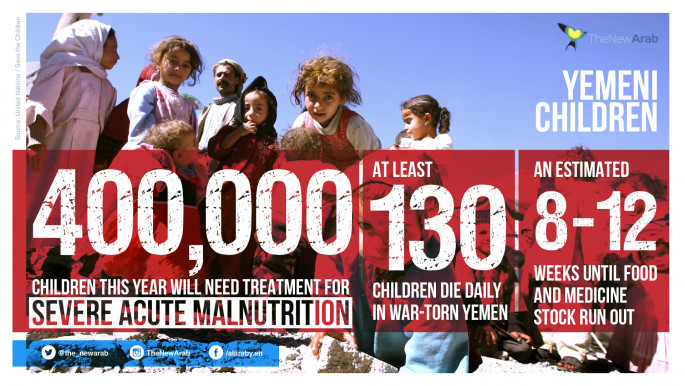Save the Children: 130 children die daily in Yemen
An international aid group has estimated at least 130 children die every day in war-torn Yemen from extreme hunger and disease.
Save the Children said that a continuing blockade by the Saudi-led coalition fighting Yemen's Houthi rebels and forces loyal to former President Ali Abdullah Saleh is likely to further increase the death rate.
"These deaths are as senseless as they are preventable," said Tamer Kirolos, Save the Children's Yemen Country Director.
"Essential medicines, fuel and food stocks could start running out in a matter of weeks," he added. "It's utterly unacceptable to let children die of neglect and a lack of political will."
Save the Children said almost 400,000 children will need treatment for severe acute malnutrition this year, but with the ongoing blockade and funding shortfalls, half of these children will go without medical care, and almost a third of those untreated will die.
It estimates its food and medicine stocks will run out in the next 8 to 12 weeks, unless the blockade is lifted soon.
Even before this latest blockade, Yemen would expect to see about 50,000 malnourished children under the age of five die from hunger or disease this year – an average of 130 a day, or one child every 10 minutes.
"It is unconscionable to punish Yemen's children by restricting access to parts of the country," Kirolos said.
The charity said it currently has five shipping containers of food for sick and malnourished children stuck in Aden because of road closures.
Saudi Arabia blocked Yemen's ports after a rebel missile attack near Riyadh. However it said Monday the coalition would lift the blockade after widespread international criticism.
 |
It's utterly unacceptable to let children die of neglect and a lack of political will |  |
A Houthi leader had vowed retaliation against Saudi Arabia on Monday after the intensification of the blockade was retracted.
The fiery comments by Saleh al-Sammad, the head of the Presidency Council of the Houthis, came during a rally of thousands of rebel supporters marching down a main boulevard in the capital, Sanaa.
Sammad said that with the blockade, the coalition "shut down all doors for peace and dialogue. "The more the blockade tightens," he said, the more the Houthis will develop their abilities to "respond to the assault of the enemy".
Saudi Arabia and its allies intervened in neighbouring Yemen in March 2015 to push back the rebels who control the capital Sanaa, in an attempt to restore the government of Abedrabbo Mansour Hadi to power.
![yemen child [Getty] yemen child [Getty]](/sites/default/files/styles/image_345x195/public/media/images/7DFEE587-3E47-490E-AD55-0FCD8E78F7C2.jpg?h=d1cb525d&itok=SpEYAdA4)




 Follow the Middle East's top stories in English at The New Arab on Google News
Follow the Middle East's top stories in English at The New Arab on Google News
![The UAE is widely suspected of arming the RSF militia [Getty]](/sites/default/files/styles/image_330x185/public/2024-11/GettyImages-472529908.jpg?h=69f2b9d0&itok=Yauw3YTG)
![Netanyahu furiously denounced the ICC [Getty]](/sites/default/files/styles/image_330x185/public/2024-11/GettyImages-2169352575.jpg?h=199d8c1f&itok=-vRiruf5)
![Both Hamas and the Palestinian Authority welcomed the ICC arrest warrants [Getty]](/sites/default/files/styles/image_330x185/public/2024-11/GettyImages-2178351173.jpg?h=199d8c1f&itok=TV858iVg)